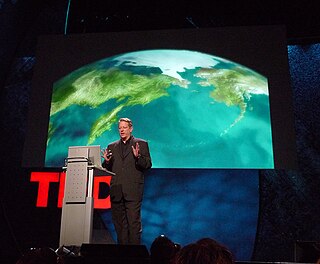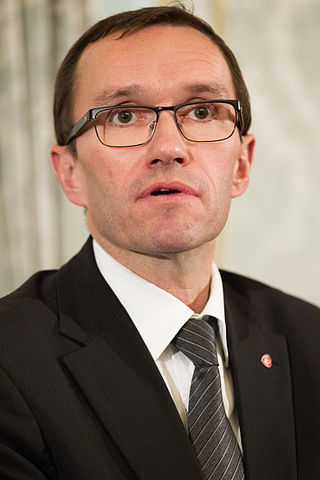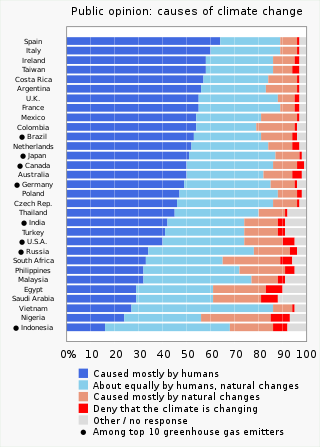
The global warming controversy concerns the public debate over whether global warming is occurring, how much has occurred in modern times, what has caused it, what its effects will be, whether any action can or should be taken to curb it, and if so what that action should be. In the scientific literature, there is a strong consensus that global surface temperatures have increased in recent decades and that the trend is caused by human-induced emissions of greenhouse gases. No scientific body of national or international standing disagrees with this view, though a few organizations with members in extractive industries hold non-committal positions, and some have tried to persuade the public that climate change is not happening, or if the climate is changing it is not because of human influence, attempting to sow doubt in the scientific consensus.

Mark Lynas is a British author and journalist whose work is focused on environmentalism and climate change. He is a contributor to New Statesman, The Ecologist, Granta and Geographical magazines, and The Guardian and The Observer newspapers in the UK; he also worked on the film The Age of Stupid. He was born in Fiji, grew up in Peru and the United Kingdom and holds a degree in history and politics from the University of Edinburgh. He has published several books including Six Degrees: Our Future on a Hotter Planet (2007) and The God Species: Saving the Planet in the Age of Humans (2011). He has stated "I think there is a 50–50 chance we can avoid a devastating rise in global temperature." Lynas is a communications strategist and climate lead for the Alliance for Science at Cornell University as well as a fellow of the German skeptics organization, GWUP.

Jon Elster is a Norwegian philosopher and political theorist who holds the Robert K. Merton professorship of Social Science at Columbia University.

The politics of climate change results from different perspectives on how to respond to climate change. Global warming is driven largely by the emissions of greenhouse gases due to human economic activity, especially the burning of fossil fuels, certain industries like cement and steel production, and land use for agriculture and forestry. Since the Industrial Revolution, fossil fuels have provided the main source of energy for economic and technological development. The centrality of fossil fuels and other carbon-intensive industries has resulted in much resistance to climate friendly policy, despite widespread scientific consensus that such policy is necessary.

Joseph J. Romm is an American author, editor, physicist and climate expert, who advocates reducing greenhouse gas emissions to limit global warming and increasing energy security through energy efficiency, green energy technologies and green transportation technologies. Romm is a Fellow of the American Association for the Advancement of Science. In 2009, Rolling Stone magazine named Romm to its list of "100 People Who Are Changing America", and Time magazine named him one of its "Heroes of the Environment (2009)", calling him "The Web's most influential climate-change blogger".

References to climate change in popular culture have existed since the late 20th century and increased in the 21st century. Climate change, its impacts, and related human-environment interactions have been featured in nonfiction books and documentaries, but also literature, film, music, television shows and video games.

Climate change denial, or global warming denial, is denial, dismissal, or unwarranted doubt that contradicts the scientific consensus on climate change, including the extent to which it is caused by humans, its effects on nature and human society, or the potential of adaptation to global warming by human actions. Many who deny, dismiss, or hold unwarranted doubt about the scientific consensus on anthropogenic global warming self-label as "climate change skeptics", which several scientists have noted is an inaccurate description. Climate change denial can also be implicit when individuals or social groups accept the science but fail to come to terms with it or to translate their acceptance into action. Several social science studies have analyzed these positions as forms of denial or denialism, pseudoscience, or propaganda.

Al Gore is a United States politician and environmentalist. He is the former Vice President of the United States (1993–2001), the 2000 Democratic Party presidential nominee, and the co-recipient of the 2007 Nobel Peace Prize with the Intergovernmental Panel on Climate Change. He has been involved with the environmental activist movement for a number of decades and has had full participation since he left the vice-presidency in 2001.

Espen Barth Eide is a Norwegian politician and political scientist. He is currently serving as the Minister of Climate and the Environment in Jonas Gahr Støre's government. He has been a been a member of the Norwegian Parliament since 2017, representing the Labour Party. He was elected to this seat in the 2017 election, and reelected in the 2021 election. From 2017 to 2021, Eide was the Labour Party's spokesperson for Energy, Climate and Environment.

Public opinion on climate change is the aggregate of attitudes or beliefs held by a population concerning issues relating to "anthropogenic climate change, perceptions of climate change risks, concern about its seriousness, and thoughts on what, if anything, should be done to address it." Public opinion on climate change is related to a broad set of variables, including the effects of sociodemographic, political, cultural, economic, and environmental factors" as well as media coverage and interaction with different news and social media.

Individual action on climate change can include personal choices in many areas, such as diet, travel, household energy use, consumption of goods and services, and family size. Individuals can also engage in local and political advocacy around issues of climate change. People who wish to reduce their carbon footprint, can take "high-impact" actions, such as avoiding frequent flying and petrol fuelled cars, eating mainly a plant-based diet, having fewer children, using clothes and electrical products for longer, and electrifying homes. Avoiding meat and dairy foods has been called "the single biggest way" an individual can reduce their environmental impact. Excessive consumption is more to blame for climate change than population increase. High consumption lifestyles have a greater environmental impact, with the richest 10% of people emitting about half the total lifestyle emissions.

Climate change in Europe has resulted in an increase in temperature of 1.9 °C (2019) in Europe compared to pre-industrial levels. Europe's climate is getting warmer due to anthropogenic activity. According to international climate experts, global temperature rise should not exceed 2 °C to prevent the most dangerous consequences of climate change; without reduction in greenhouse gas emissions, this could happen before 2050. Climate change has implications for all regions of Europe, with the extent and nature of impacts varying across the continent.

Climate change in Norway discusses global warming issues that affect Norway, whose territory comprises the western portion of the Scandinavian Peninsula plus the island Jan Mayen and the archipelago of Svalbard. All regions and seasons of Norway are expected to become warmer and wetter due to climate change.
The 2018 United Nations Climate Change Conference, more commonly referred to as the Katowice Climate Change Conference or COP24, was the 24th Conference of the Parties to the United Nations Framework Convention on Climate Change. It was held between 2 and 15 December 2018 in Katowice, Poland. The conference was held in the International Congress Centre. The president of COP24 was Michał Kurtyka. The conference also incorporated the fourteenth meeting of the parties for the Kyoto Protocol (CMP14), and the third session of the first meeting of the parties for the Paris Agreement which agreed on rules to implement the Agreement. The conference's objective was to have a full implementation of the Paris agreement.
Eco-anxiety has been defined as "a chronic fear of environmental doom". Extensive studies had been done on ecological anxiety since 2007, and various definitions remain in use. Another widely cited definition is: "the generalized sense that the ecological foundations of existence are in the process of collapse." Some scholars use the term "eco-anxiety" as a synonym for "climate-anxiety", while others like to treat the terms separately. While much ecological disruption results from climate change, some is caused by direct human activity, such as deforestation. The condition is not a medical diagnosis and is regarded as a rational response to the reality of climate change; however, severe instances can have a mental health impact if left without alleviation.

Climate change art is art inspired by climate change and global warming, generally intended to overcome humans' hardwired tendency to value personal experience over data and to disengage from data-based representations by making the data "vivid and accessible". One of the goal of climate change art is to "raise awareness of the crisis", as well as engage viewers politically and environmentally.

Warming stripes are data visualization graphics that use a series of coloured stripes chronologically ordered to visually portray long-term temperature trends. Warming stripes reflect a "minimalist" style, conceived to use colour alone to avoid technical distractions to intuitively convey global warming trends to non-scientists.

Climate communication or climate change communication is a field of environmental communication and science communication focused on the causes, nature and effects of anthropogenic climate change.
Soft climate change denial is a state of mind acknowledging the existence of global warming in the abstract while remaining, to some extent, in partial psychological or intellectual denialism about its reality or impact. It is contrasted with conventional "hard" climate change denial, which refers to explicit disavowal of the consensus on global warming's existence, causes, or effects.

The Climate Book is a collective non-fiction book directed by the climate activist Greta Thunberg. The original English edition was published in October 2022. Translations are published in languages including German, Spanish, Portuguese, Italian, French, Dutch, Swedish, Danish and Norwegian The cover features a warming stripes data visualization graphic of a type developed by British climatologist Ed Hawkins.















